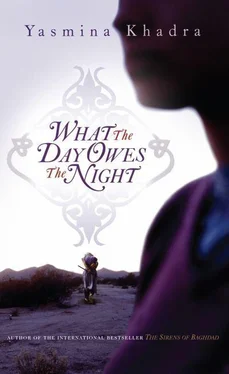When she had finished hanging out her washing, she tipped the dirty water into the drain, untucked the hem of her skirt from her belt, and went back into her dingy rat hole, where she continued to rail and curse until my mother came back.
My mother did not seem surprised to see me sitting there on a stool in the courtyard. She barely seemed to recognise me. When I went over to kiss her, she took a step back. It was only when I pressed myself to her that her arms – hesitating for an instant – finally wrapped themselves around me.
‘Why did you come?’ she asked me over and over.
I proffered the money Germaine had given me. Hardly had I held it out than, like lightning, my mother had whipped the few grubby banknotes from my hand and conjured them away like a magician. She pushed me into the poky little room where we had lived, and as soon as we were safe, took the money out and counted it over and over to assure herself she wasn’t dreaming. I was ashamed by her greed, ashamed of the unkempt hair she had clearly not brushed for ages, ashamed of the tattered haik draped like an old curtain round her shoulders, ashamed of the hunger and the pain that distorted her face, this woman who, once, had been as beautiful as the dawn.
‘It’s a lot of money,’ she said. ‘Did your uncle tell you to give it to me?’
Fearing she might react the same way my father had, I lied:
‘I saved it up.’
‘Are you working?’
‘Yes.’
‘You’ve stopped going to school?’
‘I still go to school.’
‘I don’t want you to leave school. I want you to be educated and get a good job so you can live happily for the rest of your life. Do you understand? I don’t want your children to have to live like dogs.’
Her eyes burned as she grabbed me by the shoulders.
‘Promise me, Younes, promise me that you’ll go to university like your uncle, that you’ll have a proper house and a proper job . . .’
Her fingers dug into my shoulders until I thought they might break.
‘I promise . . . Where is Zahra?’
Warily she took a step back. Then, remembering that I was her son and not some envious evil neighbour, she whispered:
‘She is learning a trade . . . She is going to be a seam-stress. I got her a post as an apprentice in a dressmaker’s shop in the New Town. I want her to make something of herself . . .’
‘Is she better?’
‘She was never sick and she wasn’t mad; she’s simply deaf and dumb. But she understands people and the senior dressmaker told me she’s a quick learner. She’s a good woman, the dressmaker. I work for her three days a week. I do the cleaning. Here or there, what’s the difference? Besides, you do what you have to to survive.’
‘Why don’t you come and live with us in Río Salado?’
‘No,’ she shrieked as though I had uttered some obscenity. ‘I can’t leave this place until your father comes back. Imagine if he came back and we weren’t here? How would he find us? We have no family, no friends in this terrible city. And besides, where is Río Salado? It would never occur to your father that we might leave Oran. No, I am staying right here until he comes.
‘But what if he’s dead?’
She grabbed me by the throat and slammed my head against the wall.
‘You little fool! How dare you! Batoul the clairvoyant told me. She saw it in my palm and she saw signs on the water. Your father is safe and well. He’s making his fortune; when he is rich, he will come home. We will all live in a beautiful house with a veranda and a vegetable garden, and there will be a garage for our new car, and all the troubles of the past will be forgotten. Who knows, maybe we might go back and buy back the lands we were forced to sell.’
All this she said quickly, very quickly, with a quaver in her voice and a curious gleam in her eye, as her hands sketched her impossible dreams on the air. Had I known that this was the last time we would ever speak, I might have believed her fantasies; might have stayed with her. But how could I have known?
Once again it was she who urged me to leave; to go back to my adoptive parents.
THEY CALLED us ‘the pitchfork’. We were as inseparable as the tines of a fork.
There was Jean-Christophe Lamy, a hulking giant at the age of sixteen. As the eldest of the group, he was the leader. His hair as blonde as a hayrick, he had a permanent smile. Every girl in Río Salado swooned over him, but ever since Isabelle Rucillio had provisionally agreed to make him her ‘fiancé’, he watched his step.
Then there was Fabrice Scamaroni, two months younger than me, a boy who had his heart on his sleeve and his head in the clouds. His sole ambition was to be a writer. His mother, a young widow who was a little crazy, owned businesses in Río Salado and Oran. She lived by her own rules and was the only woman in the whole district to drive a car. The wagging tongues in Río Salado constantly gossiped about her, but Madame Scamaroni didn’t care. She was beautiful, rich, independent. What more was there?
In the summer, we would pile into the back seat of her sturdy six-cylinder truck and she would drive us to the beach at Terga. After a swim, she would throw together a barbecue, stuffing us with black olives, lamb kebabs and sardines grilled over charcoal.
Then there was Simon Benyamin. Simon, like me, was fifteen. He was a short, fat Jewish boy who loved tricks and practical jokes. He was jolly, a little cynical because he had been unlucky in love, but he could be endearing when he wanted to. He dreamed of working in the theatre or the movies. His family was not exactly popular in Río Salado. His father trailed bad luck in his wake. Every time he set up a business it went bust, which meant that he owed money to everyone, even the seasonal workers.
Of the gang, Simon and I were closest. We lived a stone’s throw from each other, and every day he called for me and we would go and meet Jean-Christophe on the hill. The hilltop was our fort. We would meet under an ancient olive tree and look down at Río Salado shimmering at our feet. Fabrice was always last to show up, and always with a basket full of kosher sausage sandwiches, pickled peppers and fresh fruit. Together we would hang out there until late into the night, dreaming up improbable schemes and listening to Jean-Christophe talking about the tribulations he suffered at the hands of Isabelle Rucillio. Fabrice, for his part, drove us insane reciting poems and dysenteric prose strung together with words he had found in the dictionary.
Sometimes we allowed other boys to join us. More often than not this meant the Sosa cousins: José, who shared a tiny garret with his mother and ate gazpacho for breakfast, lunch and dinner, and André – we called him Dédé – who was every inch the son of his father, the stern Jaime Jiménez Sosa, who owed one of the largest farms in the area. André was sometimes a bully, he could be brutal with the hired help but he was kind to his friends. Spoiled and precocious, he was capable of saying outrageous things, seemingly indifferent to who he hurt, but I could never stay angry with him for long. Despite the cruel, casual remarks he made about the Arabs, he was always considerate to me. He did not discriminate; I was invited to his house just as often as his other friends. Yet even in my presence he was capable of disparaging Muslims, as though this was simply how things were. His father ruled his estate like a feudal lord, keeping the countless Muslim families who worked for him packed in like cattle. Wearing a pith helmet and slapping at his boots with a riding crop, Jaime Jiménez Sosa IV was always up at first light and always last to bed. He worked his ‘galley slaves’ until they dropped, and God help the malingerers. He worshipped his vineyards, and any incursion on to his land he regarded as sacrilege. People said that he once killed a goat who dared to nibble on a vine leaf and shot at the flabbergasted shepherd for trying to save the animal.
Читать дальше












